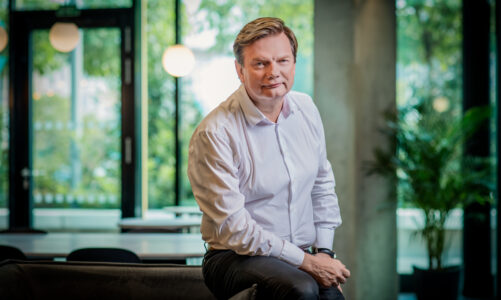Interview with Stefan Tscheppe, Managing Director of Wineries of the Princes of Liechtenstein.
You explained just recently at the Brno fair the climate challenges for the winemakers. Can you see also some advantages coming from the climate change for the Moravia/Austrian border wine regions?
It is difficult to frame climate change as an advantage of any kind. In wine marketing, a certain shift of attention to cooler climate wine growing regions and an openness towards newer or less known regions might benefit the border region. The regions along the border should be able to convey a dominant style and expression of their wines, influenced by their particular climate. A style needs to be found at leading wineries within the regions, to successfully portray a region´s distinct quality.
You call the Princelly Winery a “boutique winery”. What does it exactly mean?
A boutique winery – as we understand our winery to be – is a winery focusing on the small production of fine wines, very origin driven and in a distinct style. We strive to increase the overall expression of origin and fine wine quality in our wines, before trying to increase produced quantities. Therefore, not every wine is available all the time throughout the year and we do release our vintages whenever we think they are showing well and are ready to drink.
Can we understand it in a way that the Princely Winery is rather a story of a cultural heritage than strict business?
We are a business and economic success is very important for us, since next to farming and production practices it is an essential part of running a sustainable business. However, the cultural heritage and its representation through our distinct, high-quality wines is an essential part of our production and marketing philosophy.
Even the winemakers are talking about robots, AI, etc. But we hope the man and his love to the winemaking won´t disappear…?
The famous French term “terroir” comprises soil, climate and people. There are hundreds of decisions involved in winemaking, determined not by measurable factors such as sugar degrees or PH, but taste and experience. Hence every winemaker will make a different wine even when using the same varietals from the same vineyards. While technology may assist and help to make work more efficient, key labour in the vineyards and winery still requires thoughtful and trained hands – and tastebuds. While robots may be able to help with some work in the vineyard, like canopy management (deleafing) or spraying, their use is currently limited to relatively flat surfaces next to charging stations. Hence not for the steeper vineyards we value so much for our prestigious wines.

You manage Princely wineries in Austria and Liechtenstein, which are quite far from each other. In reality, you manage two companies, don´t you… Two wine regions, two different types of soil, wine, and also markets.
The regions and their wines are indeed very different. In 2019 we also added the limestone reef on the Leithaberg mountain range in Burgenland to the portfolio. However, there is a general stylistic expression that is Hofkellerei Liechtenstein. Freshness, elegance and a distinct structure, as well as a very animating palate is found in all of our wines. For the single vineyard wines – ageing potential is added to the style. Since all of our vineyards are under the Hofkellerei des Fürsten von Liechtenstein brand and have a similar style, while in taste adhering to their origin, it makes sense to manage them together. This also allows us to use synergies in marketing. As an example – we are selling white wine from Austria and Pinot Noir from Vaduz, Liechtenstein to fine restaurants in the US. Meanwhile we have experienced and passionate teams at both wineries, so managing has become a lot more efficient, allowing me to spend less time at the wineries and more time introducing our wines to different markets.
Thank you for the interview.




